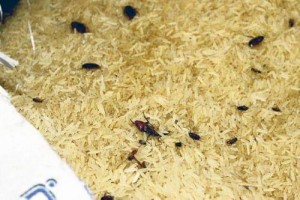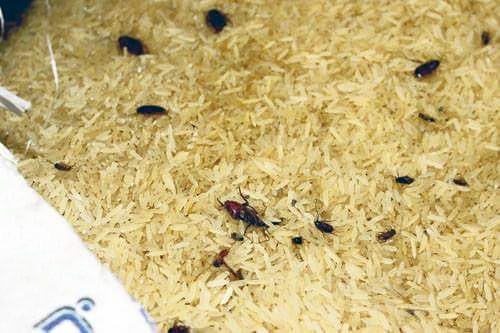By Libya Herald reporter.

Tunis, 14 November 2015:
The head of the Central Bank of Libya’s (CBL) Media Department, Essam El-Oul, has denied . . .[restrict]the CBL’s responsibility for corruption in the import of goods through Libya’s ports.
El-Oul was reacting to revelations of a ten million dinar corrupt rice import deal.
It is reported that 110 containers of rice unfit for human consumption were unloaded at Tripoli port. Social media show photos of insect infected rice.
The insect-infected 110 containers are part of a larger deal totalling 400 containers for 10,000 metric tonnes of rice at a value of LD 10.3 million.
The Letter of Credit (LC) was opened at the commercial bank, named as Jumhuria bank, Swani branch. Foreign currency transfers and LCs in Libya are ultimately conducted and the responsibility of the CBL. The LC is reported to have been opened with a deposit of 15 percent
It is also reported that the remaining 290 containers have not arrived at Tripoli port yet with unconfirmed reports that the importing company (which has been named on social media) are attempting to sneak via Ras Jdair, Libya’s main Tunisian land border.
Defending the CBL, El-Oul said that ‘‘banks, as it is widely known by international norms, do not deal in goods but deal in documents. Dealing with goods is the role of the Customs Authority, the Food and Medicine Inspection Agency and the other security agencies. Also (it is the responsibility of) the representative of the commercial bank in its Money Laundering Department who is an official of the commercial banks and not the CBL’’.
‘‘However’’, he added ‘‘when the CBL Monitoring Department and Money Laundering Unit are informed and they do not react, then the CBL can be held accountable’’
What El-Oul was attempting to explain is that in practical terms when goods arrive at Libyan ports, it is the customs authorities and various other relevant inspection and monitoring departments, depending on the type of goods imported, that get to physically come into contact and inspect goods arriving at ports.
Only after the various relevant inspection agencies ok the goods would the CBL release the balance of a letter of credit with the implication that the goods that had arrived at port are consistent in quality and price to the Pro Forma / invoices.
Whilst El-Oul is strictly correct in maintaining that physical inspection of goods is not the CBL’s role, critics nevertheless are accusing the CBL of being reactive and not proactive in countering corruption.
This is especially the case in the current situation of Libya with very weak central government agencies, weak law enforcement and weak independent media due to threats to their lives.
Some critics go as far as accusing the CBL of turning a blind eye to corruption being under the coercive influence of the current internationally unrecognized Tripoli authorities.
The CBL as well as the Audit Bureau have been making efforts to counter corruption with regards to imports and money laundering, but with the inability of the judiciary and Public Prosecutor’s Office to enforce their writ, the CBL and Audit Bureau are toothless and ineffective. [/restrict]










